Launching “Rawafid” campaign on raising communities’ flood resilience in Jordan
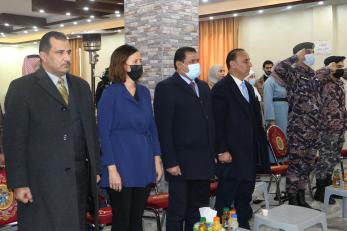
Jordan is a country with a hot and dry climate, rainfall is limited and summers are long and hot. According to the WHO, Jordan has one of the lowest levels of water resource availability, per capita, in the world. Due to climate change implications, high intense rainfalls in a short period of time makes Jordan vulnerable to flash floods and landslides in Amman, Jordan Valley, Petra, and most other populated urban as well as rural areas. Climate change is likely to further exacerbate the frequency and intensity of already existing main hazards in Jordan, such as flash floods.
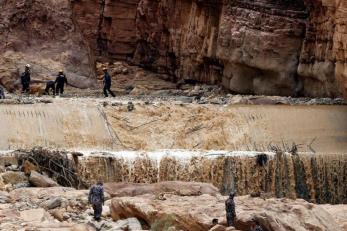
Jordan’s capacity to deal with natural hazard risk is still predominantly focused on the response stage, through “Building Communities Flood Resilience in Jordan” project, Mercy Corps is working alongside government entities concerned and the local communities to shift the focus of communities flood resilience to the prevention and preparedness to such disasters.
To raise the resilience and awareness of targeted Jordanian communities to better deal with torrential rains and floods, the project has launched an awareness-raising campaign on February 1, 2022, with the aim to implement a number of nature-based activities in the Ma’in area that will alleviate floods and torrential rains during the winter. The project targets another three flood-prone areas of Jordan including Sweimeh, Wadi Musa (Petra), and Northern Azraq.
Mercy Corps, in coordination with the Civil Defense Directorate, embarked on holding awareness sessions over a three-day period on how to evacuate, rescue, and provide first aid assistance, with sessions targeting the local community. Moreover, the organization aims to plant more than 250 forest trees over a two-day period, in coordination with the Madaba Agriculture Directorate, the Greater Madaba Municipality, and volunteers from the local community of the Ma’in area. Trees will be planted on the sides of valleys and main roads to help prevent soil erosion during floods.
The “Rawafid” campaign will also support the cleaning and opening of the valleys' streams to ensure proper drainage of rainwater. These activities will be conducted in cooperation with the Directorate of Madaba Works, the Municipality of Greater Madaba, and volunteers from the local community in the Ma’in area over a period of five days.
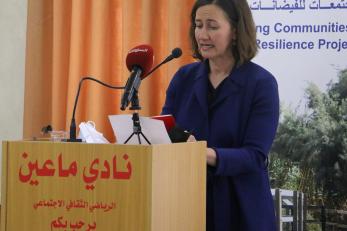
At the beginning of the campaign event, Mercy Corps Country Director, Mrs. Kari Diener, expressed how proud Mercy Corps is to partner with the official authorities for the implementation of this project, which aims to enhance the resilience of the flood-prone communities in Ma'in suffering from the impact of climate change. She added that the project guarantees a participatory work approach with members of the local community and official governmental bodies in order to mitigate the environmental and societal impact of the flood phenomenon.
Mrs. Diener further noted, “we hope that the Rawafed campaign will achieve the desired results and be the first step in Mercy Corps direction towards building the resilience and response of communities to floods.”
In his speech, the Governor of Madaba, Mr. Nayef El Hedayat, pointed out the importance of this type of project and the pivotal role it plays in addressing the phenomenon of sudden floods in the winter season. He also praised the role of Mercy Corps in supporting projects that build the resilience of local communities, including Ma'in in addressing various environmental and societal challenges.
For his part, the mayor of Madaba, Mr. Ahmed Al-Zuhair, shed light on the most important severe effects caused by floods to the environment, infrastructure, services, and others, as these effects constitute 60% of the economic losses of the state.
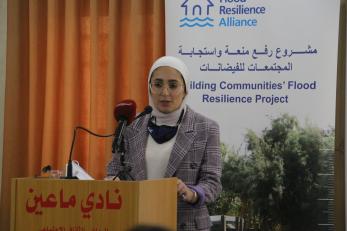
Project Manager, Engineer Shorouq Abu Razzouq, indicated that the project “Building Communities Flood Resilience in Jordan.” targets the communities most at risk of flooding in four regions in Jordan, as the past years have witnessed the significant negative impact of sudden floods on communities during the winter season in particular, and that the project is based on a participatory approach that brings together all parts of society.
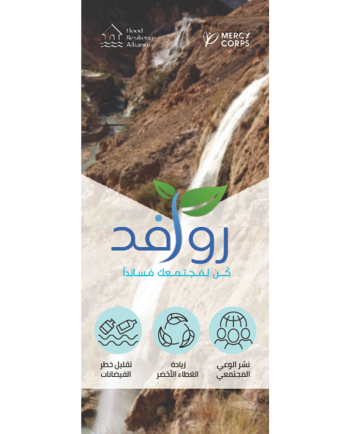
Mercy Corps Jordan through ZFRA program is working with 11 flood-prone communities (in urban and rural areas) to measure their resilience, develop interventions with the communities to address flood risks, advocate with the government to address these gaps, and share learnings with government officials and in global-level policy, forums focused on climate change and disaster risk reduction. The interventions will not only strengthen physical infrastructure but also build social and human capital through activities such as the participatory development of community evacuation plans. The program will further facilitate the development and training of community advocacy committees – the committees will identify flood resilience support needs and advocate to local government stakeholders on improved policies and investment. This participatory approach will equip communities with networks, platforms, and skills so they can actively engage with and influence local policies beyond the program phase.